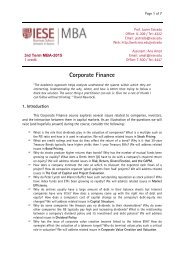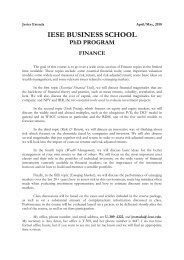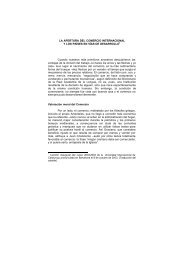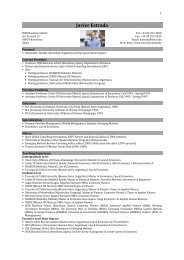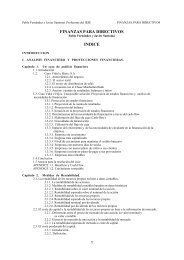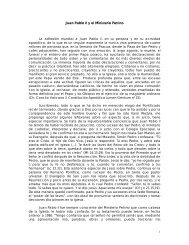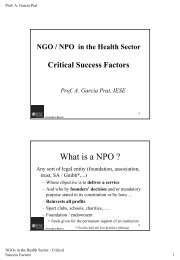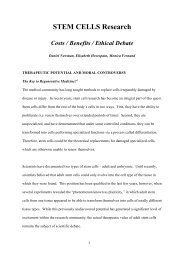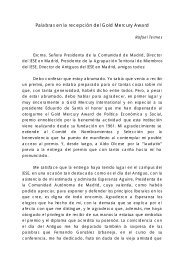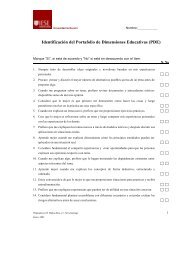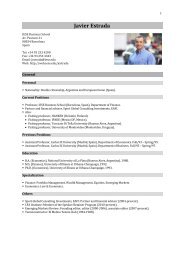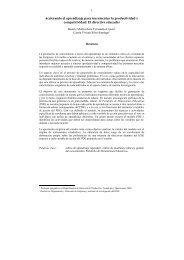GPOs and Advances Purchasing Mechanism - IESE Blog Community
GPOs and Advances Purchasing Mechanism - IESE Blog Community
GPOs and Advances Purchasing Mechanism - IESE Blog Community
You also want an ePaper? Increase the reach of your titles
YUMPU automatically turns print PDFs into web optimized ePapers that Google loves.
Fundamentally, <strong>GPOs</strong> are able to offer additional value to their provider-members<br />
because much of their operating revenue is generated through earning administrative<br />
fees paid by suppliers (at least in the US). It has been recognised that there is value in<br />
allowing such fees, given that the alternative would be for hospitals to take money away<br />
from patient care. However, some manufacturers have claimed that allowing <strong>GPOs</strong> to<br />
earn administrative fees creates a conflict of interest for <strong>GPOs</strong> <strong>and</strong> reduces their<br />
responsiveness to their provider members.<br />
<strong>GPOs</strong> play a critical role in drawing upon <strong>and</strong> consolidating the clinical expertise of<br />
hospitals. What researchers have found is that, in working with <strong>GPOs</strong>, hospitals seek to<br />
make clinically informed, evidence-based decisions about which medical products will<br />
offer the highest quality of care to patients.<br />
Another claim heard from some manufacturers is that specific contract structures create<br />
a situation where the best products are not available to providers. However, at the end of<br />
the day, it is up to individual providers whether to purchase products via a GPO contract,<br />
or whether to make purchases independent of a GPO. Additionally, in the long run,<br />
<strong>GPOs</strong> could create a monopoly or raise barriers to entry of new suppliers, indirectly<br />
rising prices.<br />
Implications for suppliers<br />
Group purchasing has several significant implications for suppliers:<br />
1. Increasing competitive pressure.<br />
Several factors associated with group purchasing <strong>and</strong> public tenders lead to an increase<br />
in price competition for suppliers. First, group purchasing implies buying more<br />
quantities of product, naturally leading to lower prices.<br />
Second, when group purchases are done through a public tender process, suppliers<br />
compete at the same time for a specific contract which pressures them to lower the price<br />
to beat their respective competitors.<br />
Third, sometimes group purchasing is done on a long-term basis meaning that the<br />
contract implies securing the supplies of a certain product for months <strong>and</strong> sometimes<br />
years. This increases even more the size of the purchase, which leads to greater price<br />
competition. For example, the public health-care organisation for Comunidad<br />
Valenciana (SERVASA) opened a public tender to buy a specific medical device for all<br />
the public hospitals of the region for the next three years. Say you are one of the<br />
suppliers <strong>and</strong> that you lose the tender. This would imply not being able to sell any<br />
volume of this medical device for three years in this region. Again, long-term group<br />
purchases pressure prices downwards.<br />
Finally, group purchasing means more transparency in prices, leading to lower ability<br />
for suppliers to do price discrimination between hospitals. Given the enormous quantity<br />
of product references consumed by a hospital, suppliers manage to sell a specific<br />
product at a much higher price to some clients than to others. When both clients do their<br />
purchases of products together, they will have more price transparency on the product<br />
ending up paying the lowest of the two prices.<br />
-10-



